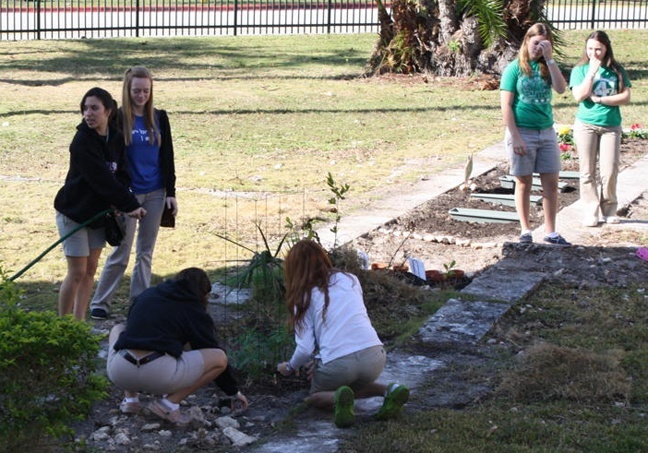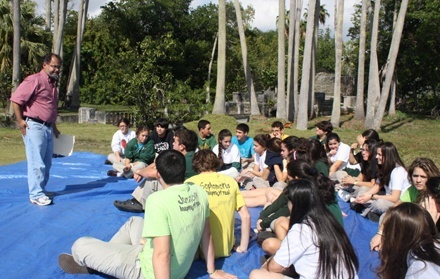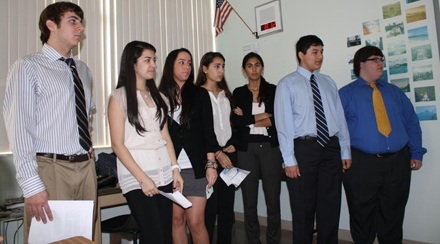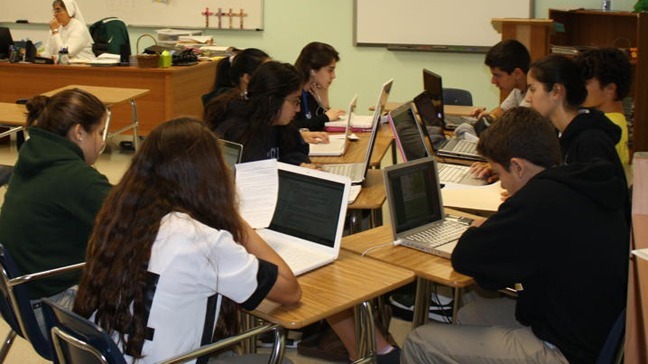By JC Moya - Immaculata- La Salle HS

Photographer: COURTESY PHOTO
One of the Slow Food Movement groups creates an organic vegetable garden at Immaculata-La Salle High as part of their SIAW project.

Photographer: COURTESY PHOTO
Teacher Danilo Recino, of Immaculata-La Salle's theology department, leads a group of students in their daily prayer experience at one of the campus' outdoor yards.
For several months, a group of nine students has quietly and self-assuredly been working with its more famous neighbor, Vizcaya, to restore what is left of the old growth mangroves that once covered the landscape surrounding the mansion.
The mangroves that remain are a fraction of the multitude of trees that defined the coast of primordial South Florida. As part of what has become an annual plunge into service and experiential learning at the high school, the students worked with Vizcaya�s chief horticulturalist, Ian Simpkins, to clear and clean the large swath of mangroves that forms the border between the school and the historic estate.
After an after-school meeting with the biologist, the nine kids offered to help Simpkins with restoration work, and took it upon themselves to recruit their friends to lend a hand.
�Ian expected to see a dozen or so kids working on the mangroves. You should have seen his face,� said science teacher Rebecca Shaw, a leader on this year�s SIAW steering committee, �when he saw 60 of them instead.�
While those students were focused on the mangroves, there were 85 other projects taking shape with equal vigor.
Five years ago, as Immaculata-LaSalle was getting back on its feet after being hit by back to back storms, Katrina and Wilma, the school decided to set about conducting an experiment in experience-based, faith-inspired and service-oriented education called Social Issues Awareness Week (SIAW).
During SIAW, there are no formal classes and the academic schedule is suspended. Instead of attending classes, students use their independence to work in small groups to address a specific issue in ways consistent with Catholic social teachings.
Rooting itself in the Catholic belief that the universe is sacramental, and that nature is a sacred reflection of God�s genius, SIAW has attempted to guide the students to better understand how Christ�s mandate to help the less fortunate extends to the environment.
According to science teacher and biologist Cecilia Calleros, �I don�t know of any other school that does this. We leave it up to the kids to come up with their own structure and they were able to propose something real and carry it out.�
Calleros added that, �for a whole school to immerse itself in a project like this one is very impressive. In other schools, you might have clubs or departments that do it, but a whole school is rare.�

Photographer: COURTESY PHOTO
One of the 86 different groups of Immaculata-LaSalle students prepare to make their presentation on their SIAW project to a panel of teacher-judges. They leave their uniforms at home and dress in professional attire for their presentation.
Calleros, a former biologist at Miami�s Metro Zoo, believes that freedom is the mother of innovation. �It was great to see what the kids could come up with on their own,� she said. �They were given broad guidelines and most came up with interesting and creative results. If we had been more specific, they may not have come up such innovative, far ranging ideas.�
She also said that SIAW allows students �to discover their leadership potential. In many cases, underclassmen had to step up and realize that others wanted them to fill that role.�
Sophomore Tony Diaz said SIAW �teaches both leadership and problem solving skills.� Because students are rarely placed in groups with more than two of their friends, Diaz said students have to learn to delegate tasks while completing the ones assigned to them.
Problem solving and real world skills also are developed because, while doing field work, �you must actually analyze the data you collect and use it to formulate solutions to problems,� Diaz said.
Sophomore Delfina Martinez-Pandiani, a veteran of schools in Argentina and South Florida, said SIAW allowed students to learn in an unconventional way. �Challenged to deviate from normal routines, each student was able to deal with the goal of solving an issue that impacts our society and realizing that even the slightest contribution can make a big difference.�
Pandiani�s group took it upon themselves to reach out to the alumni association to help them achieve the goal of transforming the school into a paperless institution. During their final presentation, they made it clear that to go paperless, the school would have to adopt new, and expensive technologies. Although there would be costs associated with the paperless revolution, the students made it clear through the data that they collected that �not to embrace technology is to reject the possibilities of the future.�
Although at times the week was stressful for many of the students, Pandiani said, �I personally feel that it was an experience that definitely will help me in the near future, by preparing me for what I'll have to do in a few years � manage time, listen to feedback, deal with other people's opinions and get hands-on interaction with our community.�
A fellow sophomore, Amy Ravelo, summed it up this way: �Just one week has changed my entire perspective on environmental issues. I never realized the extent of the problems that our planet is facing today.�
Although the focus of the week was practical in nature, the students never were allowed to lose sight of the fact that environmental stewardship has a connection to faith.
�Their lives are so full of activity, of pressures, of �stuff�; it is rare that they notice they beauty around them,� said Salesian Sister Pat Roche, Immaculata-La Salle�s principal. �The week offered them a chance to interact with nature in a meaningful way. Not only did they reflect on their responsibility to tread lightly and nurture the environment as stewards, they developed concrete strategies to be protagonists for a greener world.�

Photographer: COURTESY PHOTO
Salesian Sister Teresa Gutierrez's class researches their group's topic for their SIAW project. Sister Gutierrez is part of Immaculata-LaSalle's theology department as well as co-moderator for the freshman class.

